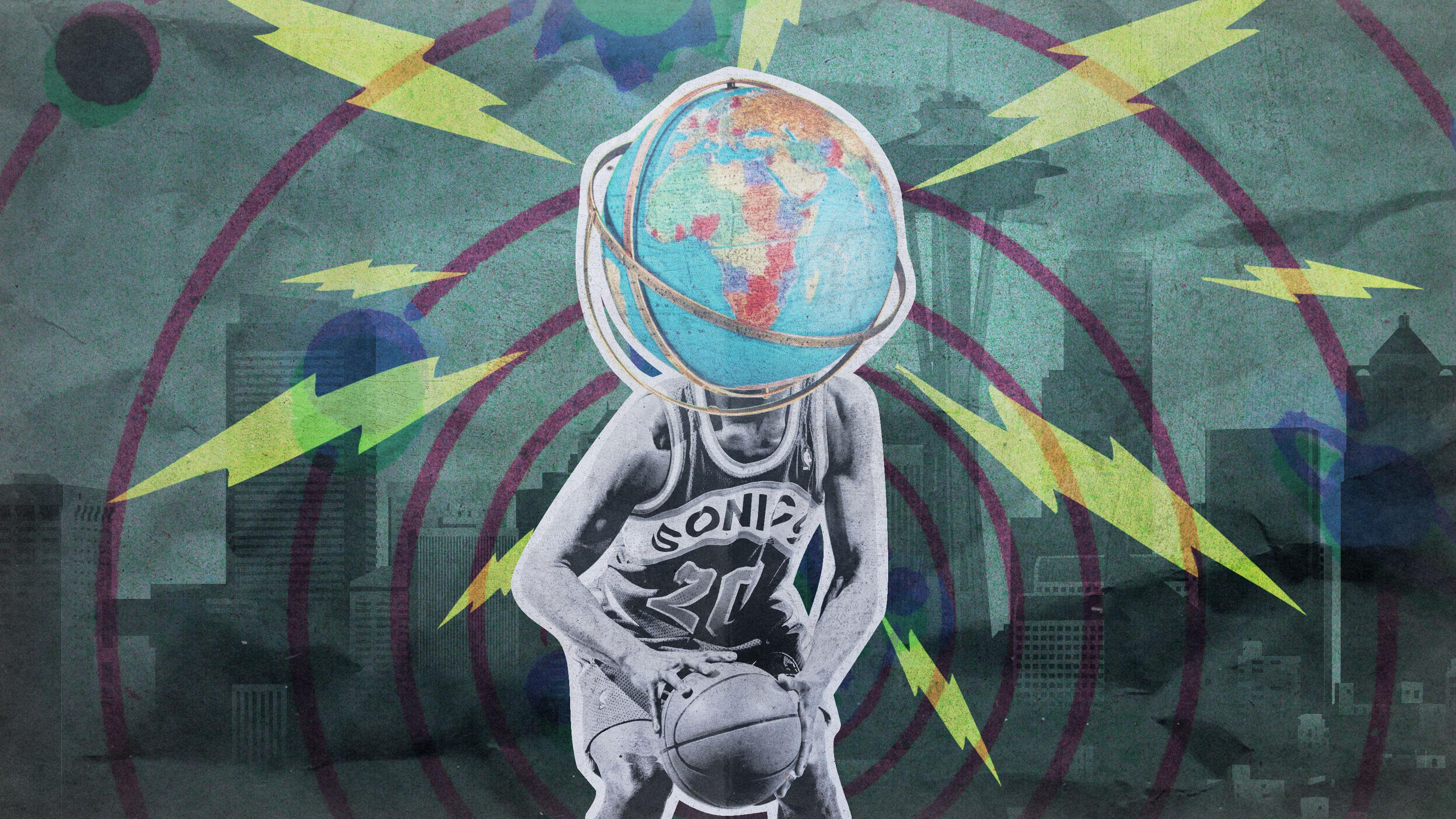
Where do you place a book like David Shields’s Black Planet in the all-NBA literary canon? Well, you might call it the Russell Westbrook of sports books. When it’s good, it’s mind-expandingly good. And when it’s bad (like the scene where Shields takes on the qualities of Sonics guard Gary Payton while having sex with his wife), it makes you feel like you picked the wrong hero. But as with Russ, the imperfectness of Shields’s chronicle of the 1994-95 Sonics is inextricable from its greatness. If it were a “better” book, it wouldn’t be half as good.
Rereading Shields sentences like “The way we have fun is to analyze how they have fun,” I was struck by something else. Nearly 20 years ago, Shields stumbled onto a mini-genre of modern NBA writing. Denied access to Payton, Shields loved him from afar—using Payton’s every on-court gesture, every word he sloughed off in media appearances, to create a superhero portrait-in-absentia. You might recognize this approach from Shea Serrano, the Free Darko collective, and a bunch of your favorite NBA writers. In some sense, Shields was the original blog boy.
Black Planet was a happy accident. An English professor on leave from the University of Washington, Shields was “covering” (his air quotes) the Sonics for Seattle Weekly. Before the first game of the season, he walked into the locker room and asked shooting guard Kendall Gill, who’s from Chicago, if they could watch Hoop Dreams together.
“He says, ‘Sure,’” Shields wrote, “but his eyes communicate, unmissably, No, of course not, you must be kidding, never, not in a million years.” Shields was never allowed in the locker room again.
With that, Shields was left to solve the dilemma at the heart of modern NBA writing. Armed only with social media and League Pass—in the ’90s it was Sonics newsgroups and basic cable—how do I get close to the players? Shields ingested newspapers, Payton’s radio show, posts on the early NBA internet, and even the notorious rap album B-Ball’s Best Kept Secret—in precisely the way that today’s blog boys and girls strip-mine memes and Instagram posts. His answer to “How do you cover the NBA without credentials?” was “You cover it like you have an MFA from the University of Iowa.”
Everywhere Shields looked he saw a barely repressed conversation about race. “In the NBA, black men rule (sort of), so we admire them (sort of); everywhere else in America we’re afraid of them,” he wrote in a typical sentence. Shields added: “Race, the league’s taboo topic, is the league’s true subject.”
This was 1994, remember. At the start of the season, fewer than 20 percent of the NBA’s coaches were black and Gregg Popovich wasn’t dunking on white privilege. The model of a paternal NBA coach was the Sonics’ George Karl, who couldn’t understand why anyone got off on trash talk (“Who thinks this is cool?”) and saw his job as redirecting Payton and Shawn Kemp’s unique qualities into his idea of a team concept. When the Sonics fell apart down the stretch, Shields lamented, “The entire season has thus become a proof of a theorem about black folks and responsibility.”
By “refus[ing] to let any thought in my head be repressed,” Shields figured he could bring the subject of race to the surface. Some stuff he just had to write down. Like when Karl calls a black player a “whipping boy,” immediately realizes his mistake, and changes it to “whipping post.” When the subheadline on an Esquire Sonics feature warns, “Hide your women.” When reporters glory in quoting a black player every time he misspeaks. (“Everything is going like clockwise,” Payton says at one point.)
Shields wasn’t just pointing fingers. He wanted to “face down my own racism and try to wrestle that to the ground.” Black Planet’s best subject was Shields himself, standing in for white NBA fans. He scrutinized his every gesture: Was he identifying with Karl too much over the players? Why was Shields, a normally surly presence in polite Seattle, suddenly smiling at a black man on the street? Was it because he wanted to prove to the man he wasn’t racist?
In the ’90s NBA, there was an odd duality: David Stern worried the players were going to scare off the suite holders, while the suite holders (or, at least, their kids) couldn’t wait to see what the players would say and do next. Shields rolled this panic around in his head and came up with this insight: “We pretend we want them to be controlled and ‘classy,’ but really what we want them to do is misbehave, so we can equate their talent with inadequacy.”
“Is race on my brain, and am I screwed up?” Shields asked at one point. “Or is it on everyone else’s brain, and am I just taking notes?” Sometimes, it was the former. I’m not sure what we learn from Shields’s close reading of the “fascinatingly nervous” Lion King, or whether Dana Barros blowing him off for an interview is an example of “a kind of very mild payback for the last 500 years” of race relations. As one of Shields’s U-Dub students tells him, “Mr. Shields … not everything is about race.”
Black Planet, the critic A.O. Scott wrote in a rave review, “suggest[s] that being a white guy … is itself a form of neurosis.” What was called “white guilt” in the ’90s and ’00s is sneeringly called “wokeness” today. But as completely as Shields unpacks his inner monologue—Black Planet may have more semicolons than any sports book in history—his book is funny and (there’s no better word) bloggy. Shields is less an academic than a real NBA fan. He notices how Payton genuflects to John Stockton. How Nate McMillan can’t pass to a teammate without looking right at him. And when little-used center Ervin “Not Magic” Johnson got a dunk against Miami, Shields was so happy he began to tear up.
The best thing about the ’94-95 Sonics was Gary Payton and the second-best thing was Gary Payton’s mouth. Living a hemmed-in life in Seattle, Shields fell in love with both. “I’m not him,” he wrote. “I’m really not him. I wish I were him. I love him—the phantasm of him—to death.”
Overconfident guards can be inherently charming. Look at how NBA Twitter lost its mind when Dion Waiters wrote for The Players’ Tribune. Books have been written in Shields’s style, too, like A Fan’s Notes, in which Frederick Exley stalked Frank Gifford in the most literary way imaginable.
Shields’s love for Payton was (mostly) safe love. He observed that Payton’s use of language on the court went beyond smack talk: “It’s that he’s trying to find the words, and if he can get comfortable with the words, he knows his game will follow.” He loved Payton’s little insurrections against Karl, and how Payton would play like he was bored, creating a “mood of flat affectlessness … which then needs to be broken—by him.”
Denied an interview with Payton, Shields studied the way Payton talked to Seattle’s mostly white corps of sports radio jocks. Black Planet has some of the best writing ever done on the medium, which Shields calls “an endlessly interesting essay on the rough patch of weather we white males understand ourselves to be going through right now.”
It’s not just sports radio’s endemic racism that strikes Shields. It’s the awkward attempts at outreach—at connecting. When Payton asks then–Sonics play-by-play man Kevin Calabro why he’s so good with words, Calabro says, “Hangin’ out with you, G., hangin’ in the posse.” When Calabro makes a similarly clumsy verbal offering to Sam Perkins, only to be shut down, Shields pounces:
“I imagine he feels trapped sometimes in his own lingo, always speaking to players in his Indianapolis-bred language, always relating to players in this false language of whiteness and sportsness; then, suddenly, of the moment, he’s feeling loose or he’s feeling some rapport and, out of a surge of empathy, he tries to jump the chasm and—the chasm yawns; the rope breaks; what do you mean we, paleface?”
Shields likes to quote Payton speaking in public and then, in an italicized zinger, show what Payton was really feeling. To a sports-radio caller who grills him about the Sonics’ offense: “It’s all instinct, you idiot.” To a host who asks Payton what Kemp said to him on the court—a question athletes have been batting away for decades: “It’s our camaraderie, not yours.”
Written through binoculars, Shields’s portrait of Payton, like a lot of modern NBA writing, is necessarily a caricature. But it’s a loving caricature, one that makes a walled-off player more human because the writer’s own humanity seeps in. In modern sportswriting, we want to find out what a player’s “really like” but will settle for answering that question about the author.
To his credit, Shields recognized this long-distance game for what it was, and he interrogated that, too. His Payton obsession was at least partly self-obsession. As he wrote: “It’s a safe love, this love, this semi-self-love, this fandom ...”
Shields added, “We’re adamant about articulating coolness because we can’t embody it.” That could be a motto for NBA writers. Or celebrity profilers. Or the people who write about celebrity profilers. Or just about anybody in journalism.
As someone who “edited” (my air quotes) a couple of Shields pieces more than a decade ago, I got a small peek at his self-reflexive process. Once, Shields gathered all his worst reviews and deconstructed them in a column. Yet the reviews for Black Planet had to penetrate even his deflector shields. Upon its release in 1999, the book was called “unimaginably stupid” and “a cult classic in search of a cult” and even “a very evil thing.”
Some of the reviews are kind of funny, because Shields was being whacked for writing like a 21st-century sportswriter. He didn’t have locker-room credentials; he was gazing in the mirror as much as gazing at the court. Black Planet, a Boston Globe critic sniffed, “often reads like a parody of pop psychology.” Pop psychology is the lingua franca of sportswriting today.
The hardest foul came from Stanley Crouch, who wrote about Shields in his book The Artificial White Man. (Shields was the titular white man.) Among other gripes, Crouch thought Shields picked the wrong heroes: “This man evidently never read or spoke to Negroes with brains who would challenge his narrow description of black people—all meat, all fantasy, all rhythm, all bad behavior at their most admirable.”
Shields had copped to his “monomaniacal” obsession with Payton and the Sonics in Black Planet. After reading Arthur Ashe’s dictum that African Americans spend time with sports they ought to be spending with books, Shields writes, “These statements make me feel defensive and guilty; they incriminate my romance with the game, but—guess what?—the guilt passes.”
A better objection is that certain thoughts in Black Planet are left uninterrogated. There’s the “Be Like Gary” sex scene. Another time, Shields finds himself stymied in bed and, for some reason, thinks of Charles Barkley’s trips to strip clubs. “I imagined Barkley at a strip club; then I came,” he writes. The image of a black athlete as human Viagra is as historically freighted as anything George Karl ever said, but the follow-up, the act of wrestling one’s own racism to the ground, never comes.
In a way, Shields was predicting the blog boys and girls who would come next. Your friendly neighborhood NBA writer may have never taken you into the bedroom. But they allowed you to watch basketball from a deeper spot inside their heads than was previously imaginable. Their own peculiar psyche became a stand-in for a whole bunch of NBA fans’. Shields once quoted someone talking about Sylvia Plath: “She’s not presenting herself as Sylvia Plath, but as a part of a larger pattern. A more grotesque manifestation of it.” To which Shields added: “My shtick, exactly.”

